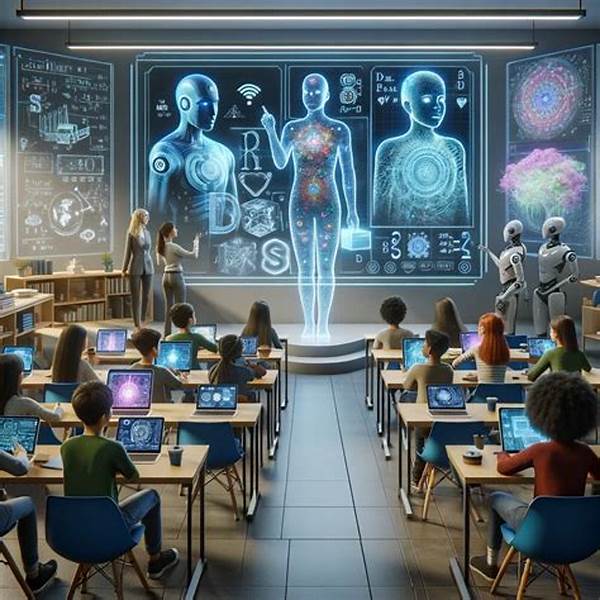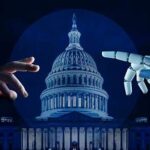How AI Shapes the Future of Education
Read More : The Future Of Ai Regulation In Southeast Asia
In an age where technology is reshaping the contours of numerous industries, education remains at the fore of this digital revolution. Imagine waking up to an academic world where the mundane drudgeries of traditional learning are replaced with a dynamic atmosphere powered by artificial intelligence—truly, a sci-fi dream come to life! As far-fetched as it may sound, AI is rapidly weaving itself into the very fabric of the educational system, crafting an environment that is more personalized, accessible, and efficient.
Upon entering this futuristic classroom, one might encounter AI-powered tutors who provide students with personalized learning experiences, where lessons are tailor-made to match individual learning speeds and styles. This is much like having a bespoke suit crafted just for you; education becomes a personal journey under the guidance of smart technology. From elementary schools to universities, the shift is palpable, invigorating classrooms with AI-enhanced tools—imagine AR apps that bring history lessons to life, or AI systems predicting and mediating student needs before they arise. Indeed, this realm is not only delightfully educational but provocatively engaging, peppered with a dose of humor—you might just find your AI tutor cracking jokes alongside quadratic equations.
But this futuristic vision of education doesn’t just stop at the individual level. AI has the potential to revolutionize the educational landscape on a global scale by bridging gaps in accessibility. It promises to extend learning opportunities to remote and underprivileged areas, where a well-trained AI system can deliver quality education to those who previously had limited access. A transformation such as this is akin to translating a blockbuster educational adventure from a few privileged viewers to a global audience—it’s a leap towards democratizing education.
Yet, while we marvel at these advancements, challenges persist. The task of integrating AI into the existing educational framework presents numerous hurdles: data privacy, digital equity, and the ever-present fear of over-dependence on technology. Thus, the conversation on how AI shapes the future of education isn’t solely about technological capabilities but a complex discourse involving ethical, psychological, and social dimensions. Join the journey into this intriguing world where education is no longer about rote learning, but a vibrant, interactive experience catered to you by your very own AI.
Revolutionizing Educational Landscapes with AI
Artificial Intelligence is shifting pedagogical paradigms with its ability to adapt and cater to diverse learning contexts. Imagine classrooms where students not only interact with human teachers but benefit from smart AI algorithms that anticipate learning challenges and craft bespoke responses to tutor each child individually. In this scenario, traditional methods are augmented with AI for a learning process that is both more engaging and effective.
From machine learning algorithms predicting exam questions to facial recognition software gauging student engagement levels, AI is truly a game-changer. It offers unparalleled opportunities for personalization, allowing educators to fine-tune curricula to the unique needs of each student. Imagine a teaching assistant that can instantly pull relevant resources and propose new strategies when a student struggles with math concepts or historical dates. This is the cutting-edge world we’re stepping into—a paradigm where AI is the trusted ally of both students and teachers.
Furthermore, AI technology enhances administrative efficiency. By automating routine tasks such as grading and scheduling, educators can devote more attention to what truly matters—teaching and mentoring. While the vision seems utopian, it also underscores the importance of maintaining a balanced approach, ensuring AI complements rather than replaces human touch in education.
Expanding Access and Overcoming Barriers
Access to education has always been fraught with inequality, but AI presents a significant opportunity to change this narrative. By democratizing learning materials and providing personalized online tutoring to even the remotest areas, AI tempts us with the promise of universal education. However, this dream isn’t without its complexities, including issues of digital divide and the necessity for robust internet infrastructures.
The thrilling world of AI-driven education is not limited by geography. Much like a tech-savvy superhero, AI steps into places traditional education cannot reach, enabling knowledge to seep into corners where brick-and-mortar classrooms might fall short. With AI, students in underserved regions can access quality resources, acquire new skills, and even partake in global classrooms.
This technological outreach doesn’t merely bridge educational gaps; it nurtures a generation of young minds with the same innovative tools that power the first-world learning systems. It stimulates an intellectual global community where learning truly knows no bounds, erasing limitations formerly posed by socioeconomic barriers. Still, we must address concerns of data privacy and ethical deployment to ensure that AI remains a force for good.
Building the Future: Collaboration or Competition?
As we bask in the transformative potential of AI in education, the pressing question remains—how will this advanced technology coexist with traditional pedagogical elements? In many ways, how AI shapes the future of education might depend heavily on how well it can complement the invaluable human touch that defines effective teaching. A harmonious collaboration may result in an enriched educational landscape, but competition might spark unprecedented challenges.
The promise lies in AI’s ability to handle repetitive tasks, thus freeing up human educators to focus on providing personalized mentorship, emotional guidance, and critical thinking support—areas where human empathy and intuition triumph. Educators will not be mere spectators in a tech-dominated space but pivotal figures enriched by AI assistance to create learning environments that are smarter and more responsive.
AV heralds a new age where education is a collaboration of human wisdom and machine efficiency—a partnership rather than a rivalry. Those who harness its potential may find education uncanny and humorous with AI quirks, but ultimately more insightful and fulfilling. As with any significant change, the trick lies in discerning where AI blends seamlessly into the educational tableau.
Actions Related to “How AI Shapes the Future of Education”
Integrating AI Responsibly in Education
In pursuit of creating an inclusive educational paradigm, we try to explore the intriguing dance of integrating AI responsibly into our classrooms. AI technology, much like a sophisticated orchestra, offers tantalizing possibilities for a harmonious educational future, provided we conduct its symphony wisely. With this integration looms the promise of tailored educational solutions designed to meet the needs of each learner individually.
Transitioning to a system that incorporates AI into its very foundations encourages not only the adoption of new learning methodologies but also the reinvention of teaching styles. The essence of how AI shapes the future of education lies in its intricate blending of traditional wisdom with technological prowess, resulting in a holistic approach to learning designed with both the heart and mind in mind.
Even as AI heralds a smarter, more adaptable learning environment, it also poses significant challenges that require thoughtful navigation. From ensuring equitable access to AI-driven resources to maintaining students’ data privacy, there’s an urgent need to address these concerns proactively. This ensures that AI serves as a benevolent tool rather than a disruptive force within the educational ecosystem.
Crafting educational experiences that capitalize on the strengths of AI while mitigating its flaws is key. As we embark on this transformative journey, educators, technologists, and policymakers alike must unite in a common purpose, orchestrating a future-ready education system that propels students into a promising tomorrow. In this mission, embracing AI innovation isn’t just advantageous; it’s essential for the effective nurturing of next-generation thinkers.
AI as an Educational Companion
The role of AI in education is likened to that of a dependable sidekick—collaborating tirelessly alongside educators to craft a learning atmosphere that is both diverse and inclusive. Education is no longer the static, one-size-fits-all model that it once was. Instead, the sweet melody of personalized learning resonates through the corridors of classrooms around the world, powered by the genius of AI.
This technological companionship doesn’t simply involve delivering content; it actively engages, assesses, and adapts to the evolving needs of students. Imagine AI-driven platforms that not only identify a student’s learning style but also offer real-time feedback and insights. Much like a savvy personal coach, AI provides students the momentum required to drive their academic journey further.
However, translating these innovations into tangible educational outcomes requires a commitment to ongoing professional development for educators. Just as students benefit from adaptive learning, teachers too must be supported in their journey to become digitally literate, embracing AI with open arms and expertise. Only then can the duo of educator and AI orchestrate an unprecedented educational crescendo.
Amidst this hopeful vision, one challenge stands firm—balancing the implementation of AI technologies with the traditional elements of education that remain invaluable. By nurturing this balance, we ensure that AI evolves not as an alien force but as an intrinsic ally in the grand narrative of education’s future. This narrative unfolds into a promising, humorously engaging story—where AI not only assists but actively shapes the educational identities of tomorrow.
Capturing the Emotional and Rational Balance in AI Education
How AI shapes the future of education surpasses mere technological feats to touch upon an emotive realm that champions our shared humanity. Imagine an educational world where AI tools are not only smart but intuitive, striking a balance that appeals both to the mind and the heart. This balance is essential for fostering educational experiences that engage students not merely cognitively, but emotionally.
The narrative arc of this AI education evolution is akin to a grand adventure—a journey that both challenges preconceived notions and promises unparalleled outcomes. By inspiring curiosity, resilience, and creativity among students, AI prepares them to face a rapidly changing world with agility and strength. At its core, this transformative power lies in AI’s ability to weave compelling stories—a marriage of data-driven precision with compelling human narratives.
Yet, as educators, technologists, and students embrace this journey, there’s an urgency to ensure the system isn’t merely a digital echo but a robust framework fostering emotional intelligence alongside academic prowess. The prospect of standardized education interwoven with personal development beckons as an enriching opportunity, ensuring students grow not only in knowledge but in character.
This emotional and rational intersection steers education toward a brighter future, enabling AI to function as more than a technological tool—transforming it into an empathetic companion nurturing the intellectual and emotional potential of the learners it serves. As we step into this future, it’s imperative to remain anchored to the human-centered heart of education, guided by empathy, creativity, and innovation—principles that have been, and always will be, at the very core of transformative learning.


